Future of Work: Why Critical Thinking and Interpersonal Skills Are Power Skills
The rise of big data, automation, artificial intelligence (AI), and robotics raises questions about what our future working and business lives will look like. As we move towards an even more digital age, companies and employees are both asking: To what extent will technology replace human intelligence and make jobs obsolete? Previous assumptions about automation and non-employee labor are giving way to a deeper understanding of its challenges in the workplace.
GetSmarter, a 2U, Inc. brand, curated ‘The Future of Work Is Here’ report with the aim to help professionals and organizations navigate these challenges. The research unpacks findings from over 8,000 respondents in 106 countries. With additional insights gathered from more than 100,000 students over the past 12 years, the report provides in-depth data of how the workplace is changing as attitudes and values shift. It also reveals that the most valued skills for the future won’t be technical, but rather those that can’t be done by machines, such as critical thinking and leadership. Furthermore, there’s a growing importance being placed on ‘soft’ or ‘interpersonal’ skills, something that human resources (HR), learning and development, and talent managers – particularly those in charge of recruitment – are taking note of.
While machines might be set to take over many technical tasks, employers and employees will increasingly place high premiums on uniquely human skills. The result of this will likely be more creative human-centered jobs, requiring higher degrees of social and emotional intelligence, and negotiation skills.
In the face of an increasingly tech-driven workplace, develop your practical negotiation skills through the exploration of strategies and real-world case studies in the Negotiation Strategies online program from Yale School of Management Executive Education.
Debunking the myths about the future of work
Despite prevailing fears of redundancy, humans are very much at the heart of the future of work. As technology assumes the menial work that humans used to do, more opportunities open up for companies to leverage the previously untapped creativity and innovation of people – and prioritize humanity and emotional intelligence at work. For people to thrive, it’s important that companies invest in programs and skills development that enhance trust, appreciation, respect, autonomy, and equity.1
To that end, it’s necessary to address and debunk some of the myths that have arisen, and aptly place the role of human beings as a core component.
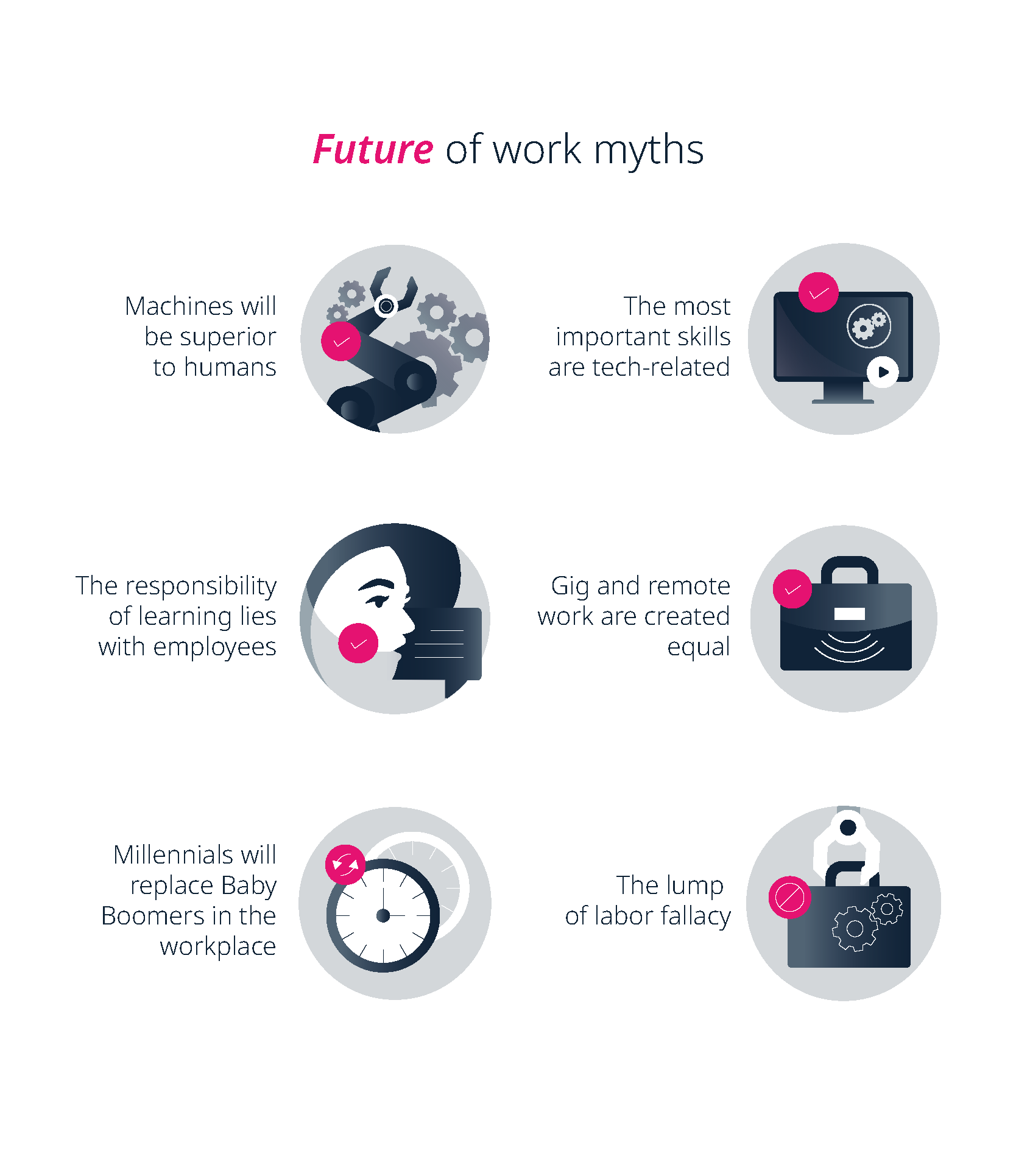
Myth 1
Machines will be superior to humans
Technology may take over the more menial tasks, but it also creates opportunities for organizations and employees to be more creative and innovative.2 It may also provide people with the time and space to improve on leadership, interpersonal, and problem-solving skills – essential talents needed to navigate an increasingly complex world. Ultimately, humans will have the capacity to become better humans.
Myth 2
The most important skills are tech-related
GetSmarter’s respondents agree that the two skills that will be most important in the future are analytical or critical thinking and leadership. What’s more, those in charge of recruitment appear to understand just how important interpersonal skills will be far better than non-HR counterparts. The demand for social and emotional skills are also anticipated to grow across industries by 26 percent in the United States and 22 percent in Europe by 2030.3
Myth 3
Gig and remote work are created equal
Before COVID-19 forced employees into remote working, it was estimated that almost two-thirds of companies were employing full-time remote workers already.4 A number which has only risen in the past few months. In contrast, only nine percent of people and HR managers respondents indicated that they hire ‘giggers’ (part-time workers without a formal contract) to fill skills gaps that exist within their teams. While past research hasn’t always made the distinction between the two, it’s predicted that the rate at which remote work is adopted will far outpace the rate at which companies adopt the gig economy.
Myth 4
The responsibility of learning lies with employees
GetSmarter’s research found that employees feel individually accountable for continuous learning, whereas talent management and HR view it as being more of a business or joint responsibility. This misalignment may mean that employees are unaware that their employer is willing to support them to learn. To remedy this, HR, learning and development (L&D), and talent managers need to lead the way within organizations and create a continuous learning culture.5
Myth 5
Millennials will replace Baby Boomers in the workplace
In 2018, for the first time in history, those aged 65 or older outnumbered children younger than five globally.6 Due to improved healthcare and quality of life, human life expectancy is on the rise, meaning more people are working for longer. Therefore, a bigger concern should be the multi-generational workforces that will be created as a result, and the challenges that this offers.
Myth 6
The lump of labor fallacy
There’s the notion that the more work is being done by machines, the fewer jobs there’ll be for people. In reality, the amount of jobs flexes over long periods of time as technology creates new desires and needs, resulting in additional positions. Important to note, however, is that when tech-related changes happen, not everyone will have the skills or opportunities to make the transition to these new positions. Government, policymakers, and influencers will have to put programs in place to ensure a smoother short-term transition.7
The impact of technology on human life
Automation and AI are here, as is the ongoing debate around technology and its impact on work. But that’s not to say humans have lost our sense of agency; the choice to use robots to perform tasks is ultimately in our hands. Instead of replacing entire jobs, it’s believed that they could possibly make professionals’ work experiences more favorable. Mundane tasks delegated to robots, and creative tasks are left to humans.8 Computer-driven work can help improve our lives through better and cheaper products and services, whilst a new generation of jobs will be created for humans who can work alongside technology.
-
Automation can help humans enjoy productive working lives
Technology influences every facet of modern life. But the COVID-19 pandemic, which has forced many people to move online and socialize through screens, has underscored just how integral technology has become in our lives.
As machines work to improve our experiences so that we can invest in more productive tasks, business leaders need to look at navigating AI in the workforce. To accomplish human productivity and business objectives, key actions include: a reallocation of resources, investment in up-skilling and reskilling employees and, on a larger scale, advancing new models of education and lifelong learning.9 Although some technological innovations have existed in the workplace for a while, they’re increasingly being used in new and exciting ways. In some cases, modern and next-gen tools, like modern video gaming, interactive apps and smartphones, have already replaced old or outdated technology, improving productivity, efficiency, and mobility.10
-
Humans are strategic; machines are tactical
When analyzing the impact of technology on the economy, business, and society, studies reveal that skill shifts are not a new phenomenon; rather, the workforce has been affected since at least the First Industrial Revolution.11 But the adoption of automation and AI marks a very different acceleration than what’s occurred in the past. It’s suffice to say that the more technical the work, the more technology can accomplish it. In other words, machines skew towards tactical applications.12 On the other hand, work that requires a high degree of imagination, creativity, and strategic thinking is harder to automate: computers are skilled at optimizing, but fall short at goal-setting, or even using common sense.
Technology will replace some work, but it won’t replace the people who have done the work, or tech-savvy professionals who are comfortable working in online environments.13 For example, ATMs took over a number of tasks bank tellers were doing, making their roles redundant, but at the same time it gave existing workers the opportunity to upskill and sell a wider range of financial services. As American economist James Bessen notes, “The problem is that people are losing jobs, and we’re not providing them with the skills and knowledge that they need to prepare for new jobs.”14 The immediate call to action then is to rethink the shape and characteristics of the workforce, and to generate a new human resource development agenda that is both technological and human.15
Not all skills are created equal
GetSmarter’s research respondents agree that analytical and critical thinking is most valued in the workplace, both currently and in the future, while technical skills are rated in the middle in both instances, and digital capabilities feature last. Discover what these skills entail below:
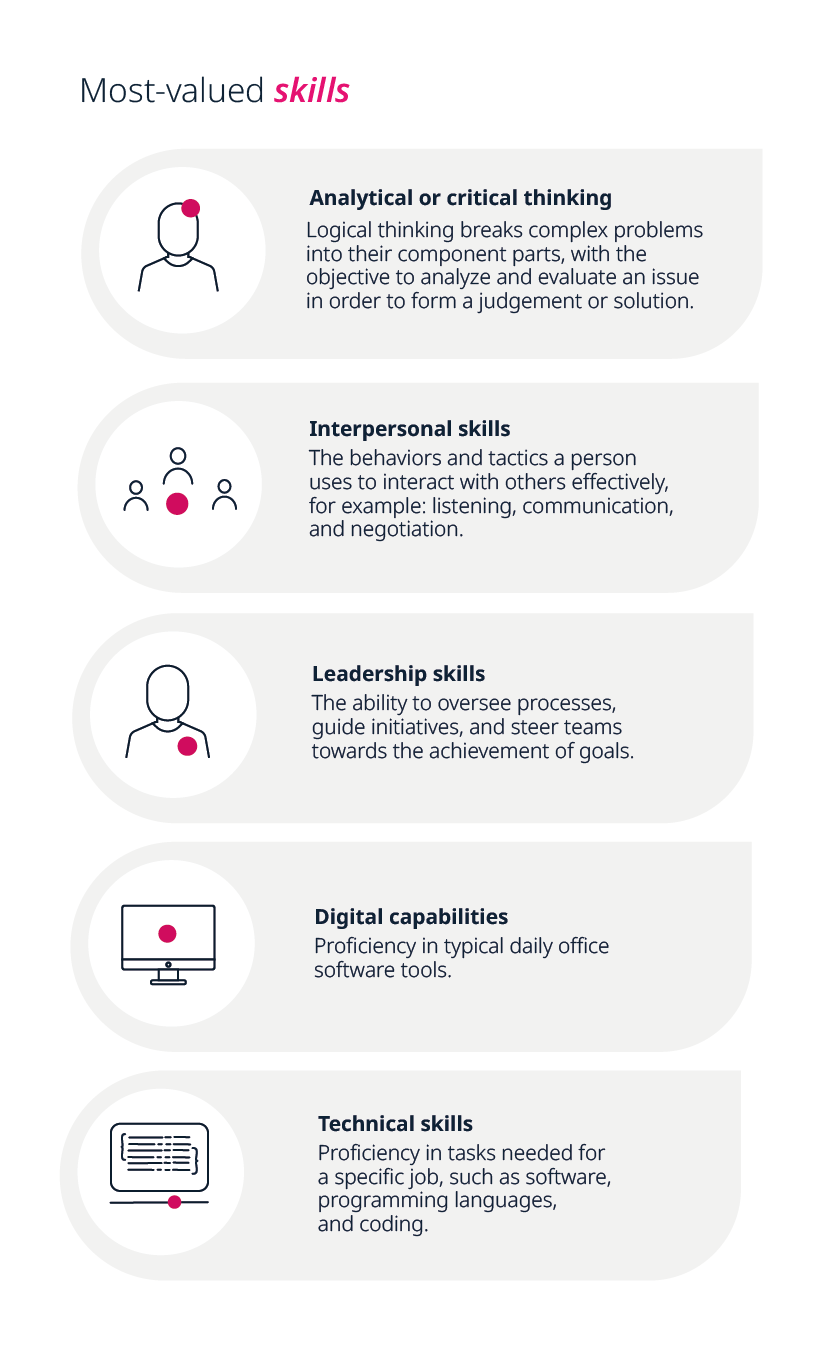
In order to better leverage these human-centric skills, companies across all industries need leaders who can communicate persuasively and effectively, meet business objectives, influence various stakeholders, and drive positive change. The Communicating for Influence and Impact online short course from the University of Cambridge Institute for Sustainability Leadership (CISL) provides comprehensive insights and a range of tools to develop impactful communication.
-
The most valued skills in the future
In its research, GetSmarter assessed the current and future values that people assign to different skills by asking:
- Which of the following skills do you currently value most in employees? Or which of the following skills does your employer currently value the most?
- Which of the following skills are you anticipating to be most valuable to your organization in the next 18 months?
Every working professional, no matter their role or function, should start preparing themselves for the increase in value that will be placed on uniquely human skills. GetSmarter’s data reflects that across generations, and employee and managerial levels, there’s widespread acknowledgement that analytical and critical thinking skills will become even more valuable and sought after in the future. The relatively low value that respondents placed on technical skills is likely based on the expectation that machines will take over technical tasks, leaving cognitive and creative tasks to humans.
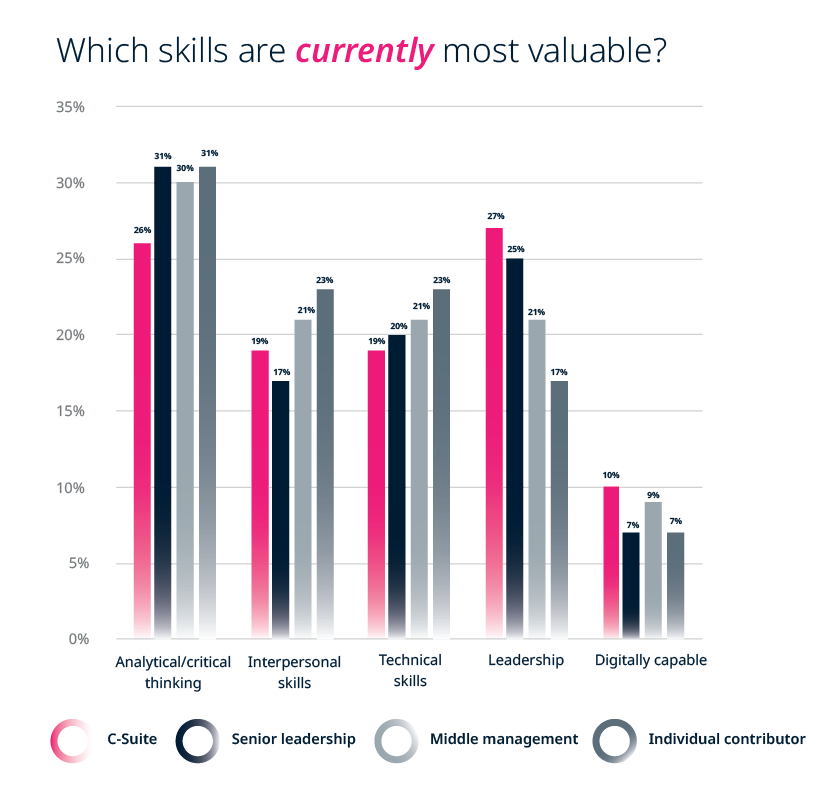
When broken down by generation, the data reveals that younger people in Generation Z perceive technical skills and digital capability as far more valuable compared to other groups. As digital natives, this is to be expected. However, they also agree that analytical and critical thinking skills hold the most value overall, followed by interpersonal skills. This shows that even the digitally native generation acknowledges the value of uniquely human skills.
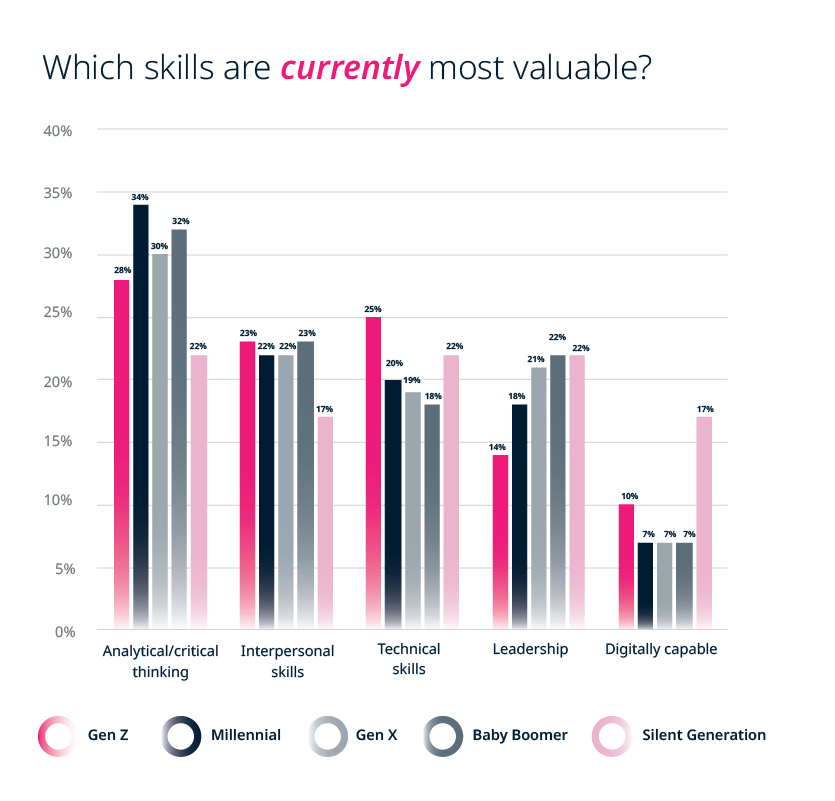
As a result of this evolving business landscape, there’s a growing need for highly skilled leaders who can navigate through these complex challenges and empower their teams to succeed. Combining theory and practice, the Oxford Executive Leadership Programme, from Saïd Business School, University of Oxford, is centered around refining your leadership skills and purpose in line with your company’s strategic focus.
The ability to think analytically and critically, to lead teams, and build productive interpersonal relationships are the factors that will help one candidate stand out from another in the future workplace. These skills are highlighted as the areas where the largest skills gaps currently exist.
Organizations need to ensure that education and employment are fit for the needs of a changing world, one where new skills and learning are a continual part of a professional’s life. The GetSmarter Skills Hierarchy offers five key areas as a guide for where the workforce may need to upskill or reskill in the near future in order to stay relevant.
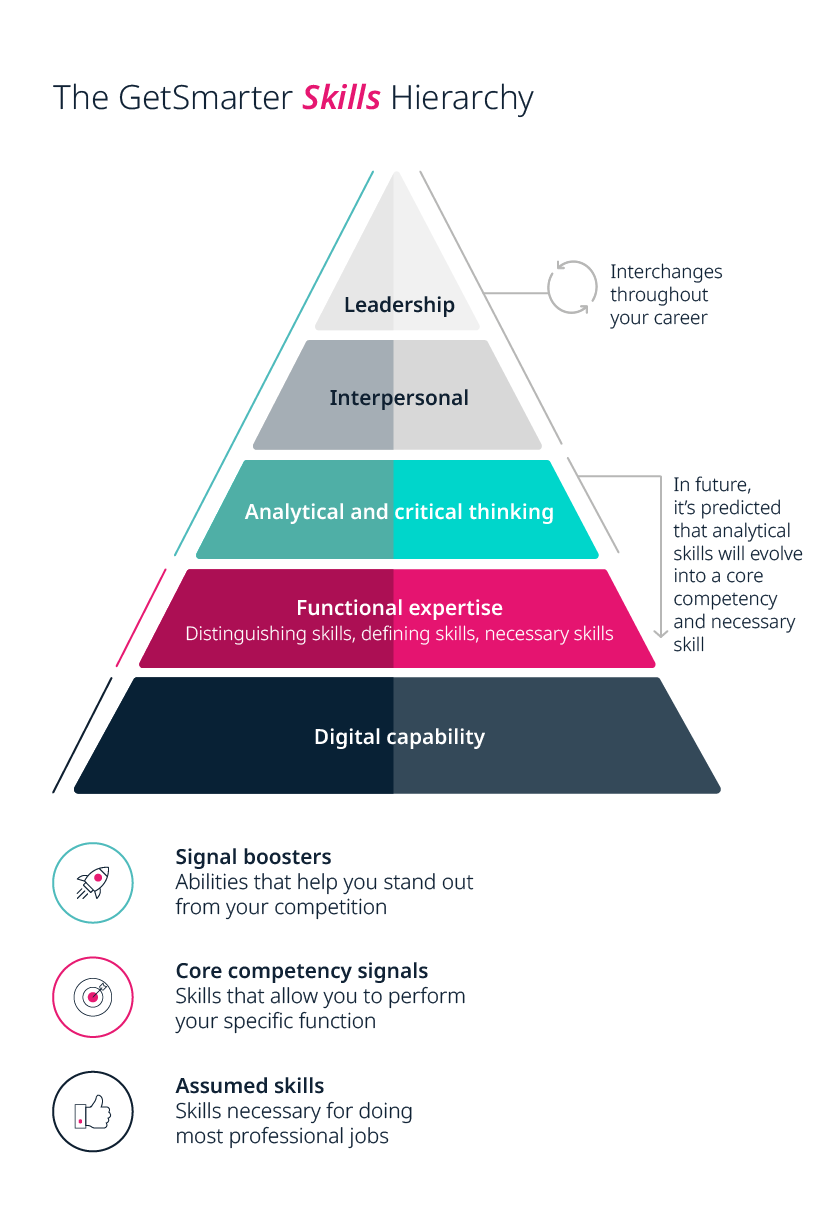
The future of work is human
In a time of rapid change and uncertainty, people have become the most valuable asset to companies. The ability to balance work and life, aided by technology, will be a key factor in shaping people’s lives over the next decade. Businesses and employees can prepare for the future of work by aligning their purpose, culture, vision, and values to the needs of the changing workplace, and prepare for a new division of labor between humans and machines.
How prepared are you for the future of work?
Explore the rest of this series of blog articles here
Stay competent, confident, and informed
Sign up to our monthly newsletter to receive the latest course information, expertise from renowned thought leaders, and a summary of our most recent blog articles.
- 1 (Sep, 2019). ‘The future of work is human’. Retrieved from Workhuman.
- 2 (Sep, 2019). ‘The future of work is human’. Retrieved from Workhuman.
- 3 Bughin, J. et al. (May, 2018). ‘Skill shift: Automation and the future of the workforce’. Retrieved from McKinsey.
- 4 (Feb, 2018). ‘New report finds majority of companies are embracing remote teams, yet more than half lack a remote work policy’. Retrieved from Upwork.
- 5 Maier, S. (Dec, 2018). ‘5 steps to developing a continuous-learning culture’. Retrieved from The Business Journals.
- 6 (Jan, 2019). ‘The job and hiring trends you’ll see in 2020 and beyond’. Retrieved from Glassdoor.
- 7 Kagan, J. (Mar, 2018). ‘Lump of labor fallacy’. Retrieved from Investopedia.
- 8 Climer, N. (Aug, 2019). ‘Automation can help humans enjoy happy, productive working lives’. Retrieved from Financial Times.
- 9 Fleming, M. (Mar, 2020). ‘AI is changing work – and leaders need to adapt’. Retrieved from Harvard Business Review.
- 10 Ricard, S. (Apr, 2020). ‘Five technology trends impacting the workplace in 2020’. Retrieved from Forbes.
- 11 Bughin, J. et al. (May, 2018). ‘Skill shift: automation and the future of the workforce’. Retrieved from McKinsey.
- 12 Bughin, J. et al. (May, 2018). ‘Skill shift: automation and the future of the workforce’. Retrieved from McKinsey.
- 13 Ricard, S. (Apr, 2020). ‘Five technology trends impacting the workplace in 2020’. Retrieved from Forbes.
- 14 Pistrui, J. (Jan, 2018). ‘The future of human work is imagination, creativity, and strategy’. Retrieved from Harvard Business Review.
- 15 Pistrui, J. (Jan, 2018). ‘The future of human work is imagination, creativity, and strategy’. Retrieved from Harvard Business Review.